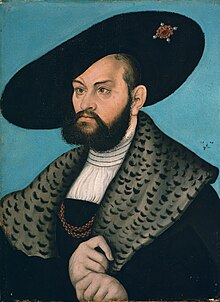Albert of Brandenburg-Ansbach
| Albert | |
|---|---|
| Grand Master of the Teutonic Knights Duke of Prussia |
|

Albert of Prussia, painting by Lucas Cranach the Elder, dated 1528
|
|
| Grand Master of the Teutonic Knights | |
| Reign | 1510 – 1525 |
| Predecessor | Duke Frederick of Saxony |
| Successor | Walter von Cronberg |
| Duke of Prussia | |
| Reign | 10 April 1525 – 20 March 1568 |
| Successor | Albert Frederick of Prussia |
| Born |
17 May 1490 Ansbach |
| Died | 20 March 1568 (aged 77) Tapiau Castle, Tapiau (modern Gvardeysk) |
| Spouse |
Dorothea of Denmark Anna Marie of Brunswick-Lüneburg |
| Issue |
Albert Frederick (among others...) |
| House | House of Hohenzollern |
| Father | Frederick I of Brandenburg-Ansbach |
| Mother | Sophia of Poland |
| Religion |
Roman Catholicism (until 1525) Lutheranism (since 1525) |
Albert of Prussia (German: Albrecht von Preussen, 17 May 1490 – 20 March 1568) was the 37th Grand Master of the Teutonic Knights, who after converting to Lutheranism, became the first ruler of the Duchy of Prussia, the secularized state that emerged from the former Monastic State of the Teutonic Knights. Albert was the first European ruler to establish Lutheranism, and thus Protestantism, as the official state religion of his lands. He proved instrumental in the political spread of Protestantism in its early stage, ruling the Prussian lands for nearly six decades (1510–1568).
A member of the Brandenburg-Ansbach branch of the House of Hohenzollern, Albert became Grand Master, where his skill in political administration and leadership ultimately succeeded in reversing the decline of the Teutonic Order. But Albert, who was sympathetic to the demands of Martin Luther, rebelled against the Catholic Church and the Holy Roman Empire by converting the Teutonic state into a Protestant and hereditary realm, the Duchy of Prussia, for which he paid homage to his uncle, the King of Poland, Sigismund I. That arrangement was confirmed by the Treaty of Kraków in 1525. Albert pledged a personal oath to the King and in return was invested with the duchy for himself and his heirs.
Albert's rule in Prussia was fairly prosperous. Although he had some trouble with the peasantry, the confiscation of the lands and treasures of the Catholic Church enabled him to propitiate the nobles and provide for the expenses of the newly established Prussian court. He was active in imperial politics, joining the League of Torgau in 1526, and acted in unison with the Protestants in plotting to overthrow Emperor Charles V after the issue of the Augsburg Interim in May 1548. Albert established schools in every town and founded Königsberg University in 1544. He promoted culture and arts, patronising the works of Erasmus Reinhold and Caspar Hennenberger. During the final years of his rule, Albert was forced to raise taxes instead of further confiscating now-depleted church lands, causing peasant rebellion. The intrigues of the court favourites Johann Funck and Paul Skalić also led to various religious and political disputes. Albert spent his final years virtually deprived of power and died at Tapiau on 20 March 1568. His son, Albert Frederick, succeeded him as Duke of Prussia.
...
Wikipedia
